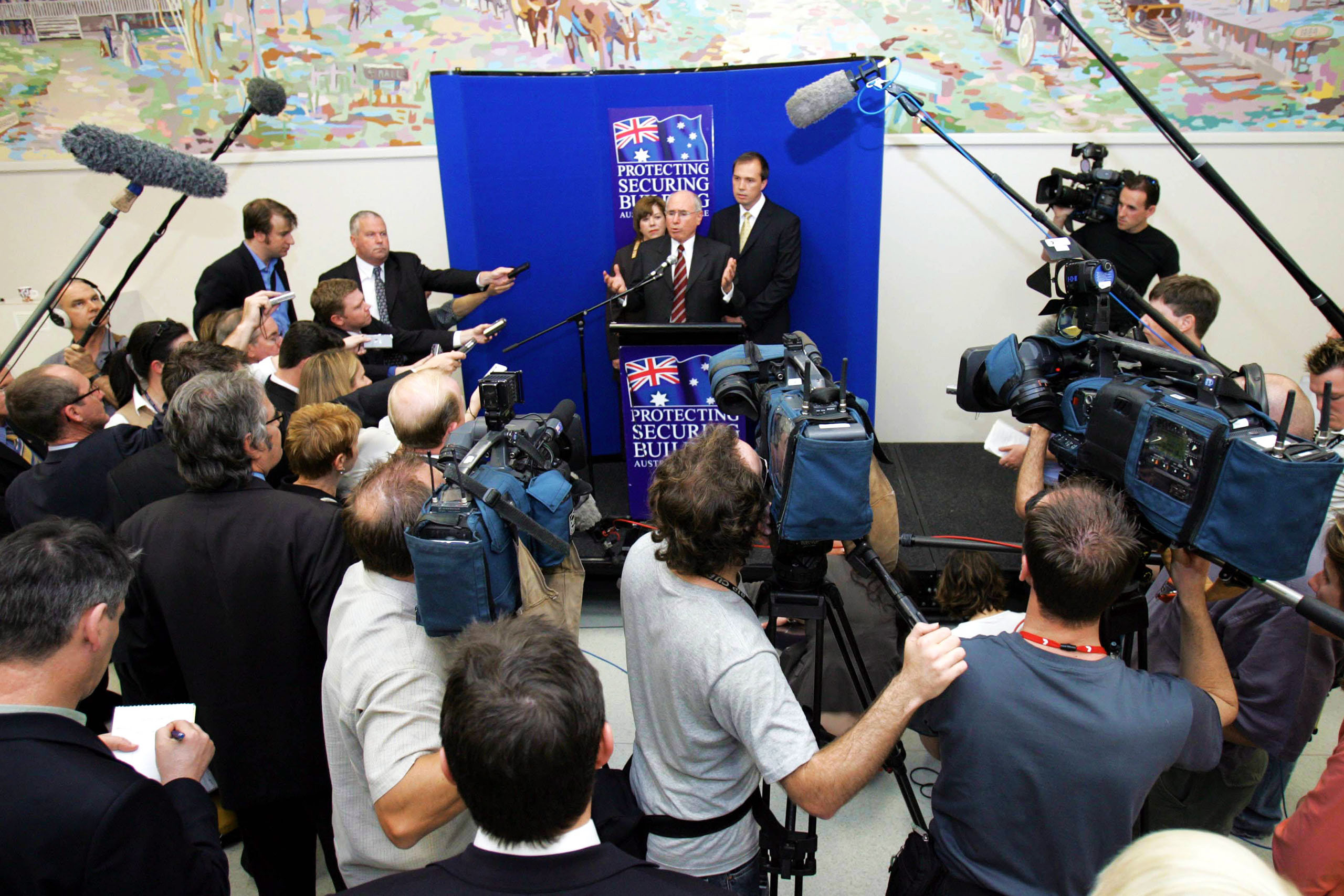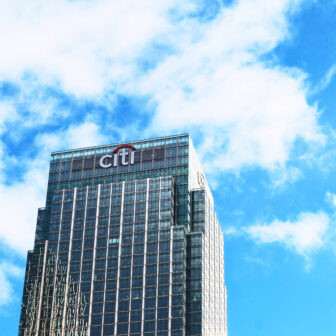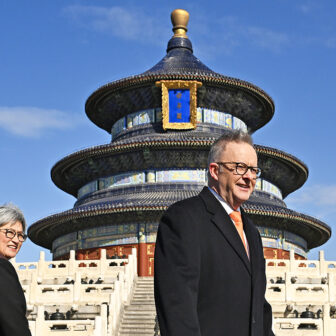Given Peter Dutton’s own admissions, it is no surprise that writer Lech Blaine sees the Liberal leader’s experiences in the police force as having encouraged a narrow, black-and-white view of the world. In his insightful new Quarterly Essay, Bad Cop: Peter Dutton’s Strongman Politics, Blaine also notes that Dutton plays up his nine-year career as a cop to appeal to everyday suburban Australians while downplaying the three decades he has spent as a very financially successful property developer.
While he acknowledges the influence of Queensland’s bipartisan history of populist leaders, the best-known of whom was Joh Bjelke-Petersen, Blaine also suggests that John Howard has particularly influenced Dutton’s socially conservative culture-war focus on issues such as race and immigration. But while Howard used a dog whistle, he writes, Dutton uses a foghorn.
Blaine highlights the most contentious statements that Dutton has made about race and ethnicity, from his claims about African gangs terrorising Melbourne’s would-be diners to his criticism of Liberal prime minister Malcolm Fraser for letting in too many Lebanese. He also analyses Dutton’s most contentious ministerial actions in portfolios ranging from workplace participation and immigration to home affairs. Victims of Dutton’s “bad cop” toughness range from the unemployed and single mothers, who suffered from his demonisation of welfare recipients, to deportees, particularly Māori and Pacific Island New Zealanders, who encountered the sharp end of Dutton’s law and order push.
As a minister Dutton may have been an authoritarian populist, but Blaine reminds us that while he was home affairs minister his department awarded highly questionable and very expensive contracts to the companies chosen to manage offshore detention. Visa abuses involving those who came to Australia by plane — ranging from the exploitation of “modern-day indentured labourers” and “sex slaves” to the entry of “Albanian gangsters” — meanwhile went unheeded.
Dutton’s selective toughness has a clear strategic rationale. On numerous occasions he has set out his plan to win government especially by using culture war tactics to attract working-class voters in outer-suburban seats traditionally held by Labor. He claims that cost-of-living pressures and other challenges faced by workers have been neglected by a Labor government preoccupied with woke “frolics” on issues such as the Voice. He argues that crime (often associated by Dutton with racial or ethnic groups) is out of control, and often a particular threat to women. It is a strategy that draws on John Howard, Tony Abbott and Donald Trump.
Nonetheless, both Liberal and Labor critics believe that Dutton’s strategy is flawed for modern-day Australia. It might be suited to his own seat of Dickson, writes Blaine, where the vast majority of residents are Australian born, “but he has little experience speaking to electorates in Sydney and Melbourne with significant Asian and Middle Eastern diasporas.” Here, Dutton’s bad cop routine can come unstuck, as when his strongman rhetoric on national security issues alienated Chinese-Australian voters.
Nor, Blaine points out, does Australia have the equivalent of Trump’s “heartland states filled with rust belts, nor the political system that makes them disproportionately powerful.” Yet winning back affluent teal seats, whose voters are alienated by Dutton’s rhetoric, may still prove crucial if the Liberals are to win government in their own right.
Blaine is at his best analysing such issues. Nonetheless, some of his insights — particularly regarding Dutton’s strongman persona — could be developed further or in a different direction. He argues that Dutton’s “raison d’être” is to “Make Australia Afraid Again. Then he will offer himself as the lesser of two evils. A serious strongman for the age of anxiety.” Recent events — fears evoked by the Voice referendum, for example, and crime in Alice Springs, and offences committed by immigration detainees released by a High Court decision — have fed into that strategy.
Blaine argues that Dutton is attuned to key voters’ “deepest fears” not because he is “a genius or a psychic, but because he was also afraid of change.” Possibly “because he would have felt emasculated by the truth,” Dutton has never fully explained why he left the police force. Consequently he is “always displaying simplicity and strength. Because he feels so complicated and weak.” Indeed, Blaine depicts Dutton as an inherently fragile human being: “Tall and strong at first glance. But when you watch him for a long time, you can see that the man is small and scared.”
Blaine’s psychological assessment of Dutton is intriguing and possibly insightful. But additional or alternative interpretations would have been worth exploring in more depth. After all, as Blaine himself acknowledges, conservatives’ mobilisation of fear against Labor governments is far from new. Conservative ideology is inherently wary of change, so this doesn’t necessarily reflect Dutton’s own vulnerabilities.
Similarly, the Liberals have a long history of using strongman politics to try to emasculate their Labor opponents, so Dutton’s appearance of strength may not be concealing deeper insecurities about his own masculinity. As Blaine himself notes, Dutton’s comment that Albanese is “a weak and woke prime minister” evokes Howard’s description of Kim Beazley as lacking “ticker.”
The point about strongman politics is precisely that it is a performance of masculinity, and of protective masculinity in particular. Dutton is arguably not so much offering to be the “bad cop” who is the “lesser of two evils,” to use Blaine’s words, as offering to be a strong “good cop” who defends those he perceives as upstanding citizens from the dangers he argues weak Labor politicians are exposing them to. He is offering to be a traditional masculine protector who will keep his favoured voters safe from “woke” identity politics, from the elites, from criminals, from China, from reduced living standards and even from the undermining of gender binaries. He’ll only be the “bad cop” to those his would-be supporters resent and fear.
Dutton’s potential appeal is therefore also broader than Bad Cop credits. Blaine writes, for example, that Dutton is a “practitioner of right-wing identity politics” who highlights difference and has spent his career “persuading Australians to prioritise cultural belonging above egalitarianism.” Dutton does indeed have a narrow view of Australian cultural identity that marginalises some Australians and privileges others. Despite attempts to construct him as a “big gentle giant” who genuinely cares about people, his expressions of empathy are highly selective. Nonetheless, it is a bit more complicated than Blaine suggests.
For example, Dutton’s arguments against the Voice actually constructed him as a champion of egalitarianism, but one who argued that equality means treating all Australians the same regardless of their needs or circumstances. It is a longstanding argument by social conservatives. Dutton highlights difference when it serves his purpose but also denies its salience, arguing that he is defending the vast bulk of Australians from the “divisive” identity politics of the elites. Indeed, this argument lies at the heart of his populism. Dutton’s close association with Jacinta Nampijinpa Price, meanwhile, a National Party senator with a similar conception of equality, helps to defuse accusations of racial bias.
Dutton’s styling of himself as a strong male economic provider who will protect voters from rising living costs is a common political strategy that draws on the traditional role of the male head of household as protector and provider. It too channels Howard, Abbott and Trump. Trump’s campaign in particular has long targeted working-class males.
This is a gender politics that Labor needs to take seriously. Labor won office partly on the argument that the Liberals had a woman problem, as indeed they do. But Dutton wants Labor to have a men problem.
Albanese needs to tread cautiously. His emphasising of the fact that Dutton’s team “is dominated by blokes” and “they keep having preselections and putting up more blokes” will play well with many female voters and socially progressive men. But it could be phrased more strategically. Albanese needs to be careful that he isn’t depicted as being “anti-bloke” as well as woke, especially with the Coalition mobilising old climate wars rhetoric to suggest that real men don’t drive electric vehicles but do embrace nuclear power.
Despite Dutton’s claims, the Labor government has been making serious efforts to tackle wage stagnation, precarious employment and other working-class issues, often encountering business and Liberal opposition in the process. Many of the social equity reforms the government has pursued, including improving the pay of under-valued female-dominated jobs and lowering childcare expenses, have also had benefits for workers and have reduced living costs. Nonetheless, the government is vulnerable to Dutton’s charges of working-class neglect given that inflation and high interest rates continue to undermine many of its best efforts.
As well as successfully tackling living costs, Albanese will need to win the argument that his form of caring, socially inclusive masculine leadership is not a sign of weakness but is better for Australians in general than Peter Dutton’s alternative. After all, gender politics isn’t an aside in Dutton’s politics, it is central. Democrats successfully targeted Trump’s masculinity during the 2020 presidential election campaign by arguing for the benefits of a different kind of protective male leadership — although their task was made easier then by the politics of the pandemic and is made harder now by Biden’s frailty.
We wait to see how successful Labor will be in countering Dutton’s strongman politics, as well as his attempts to encroach on Labor’s heartland. •
Bad Cop: Peter Dutton’s Strongman Politics
By Lech Blaine | Quarterly Essay | $27.99 | 172 pages




